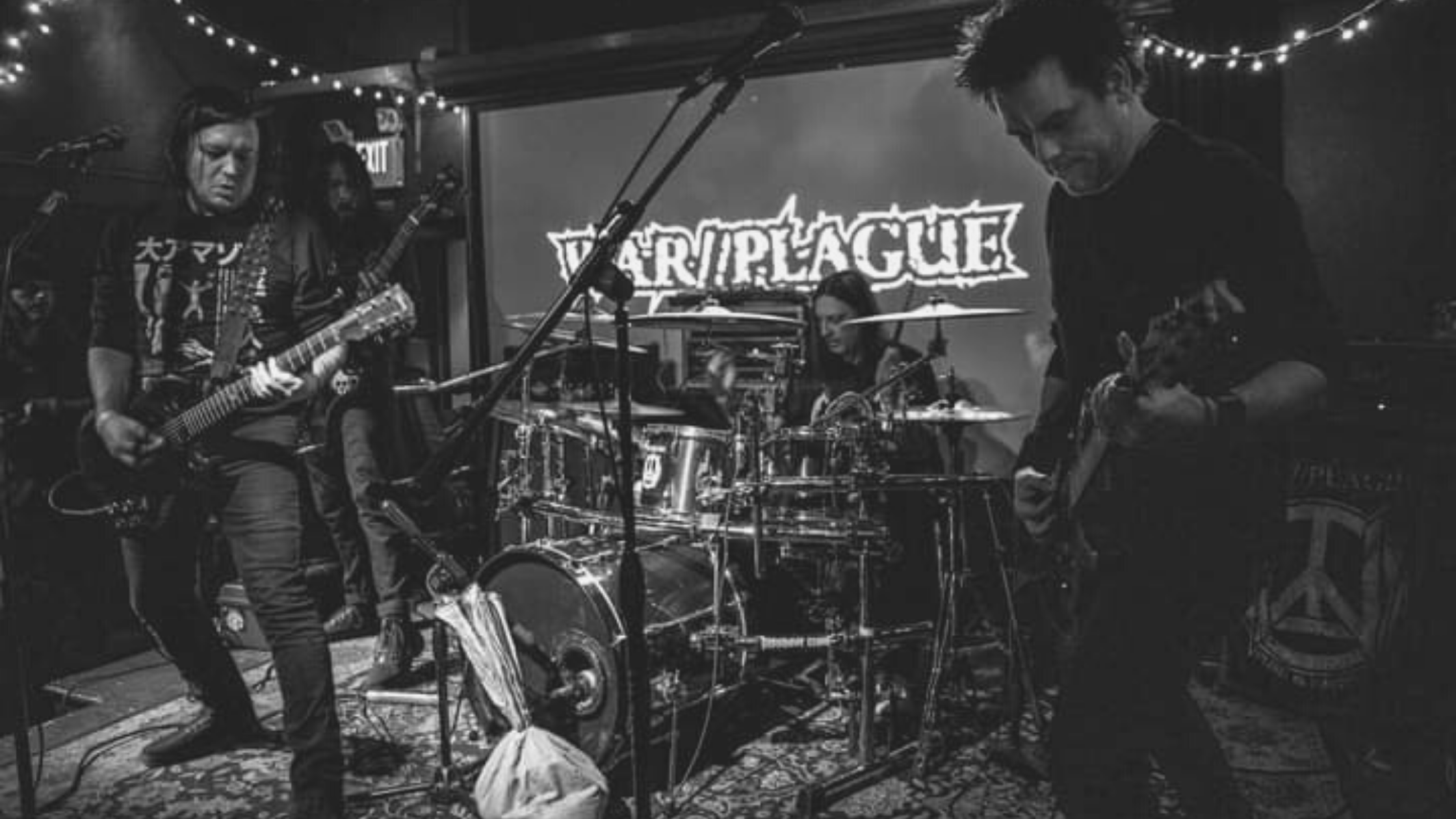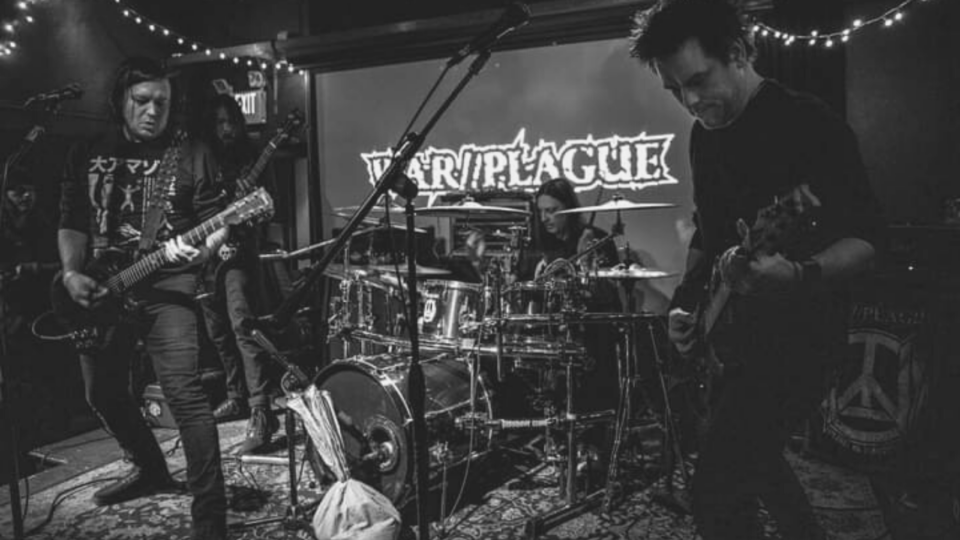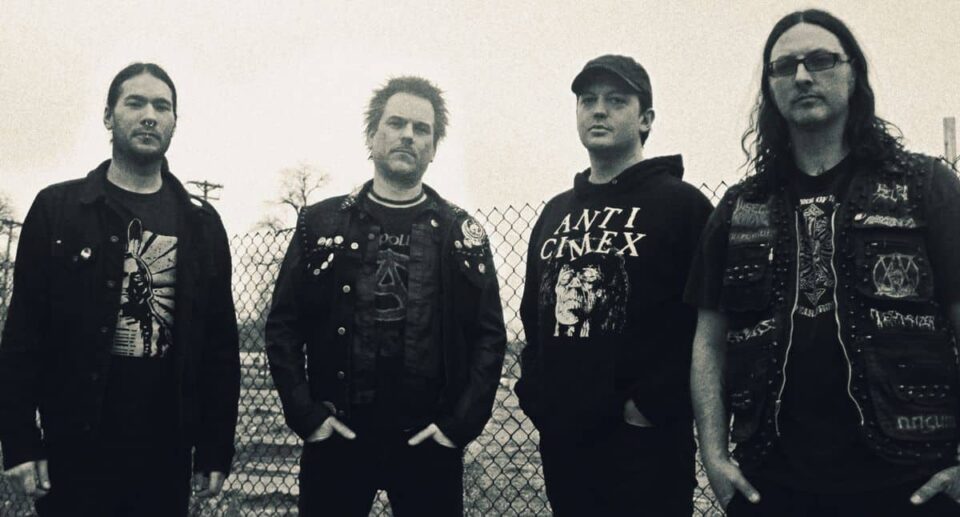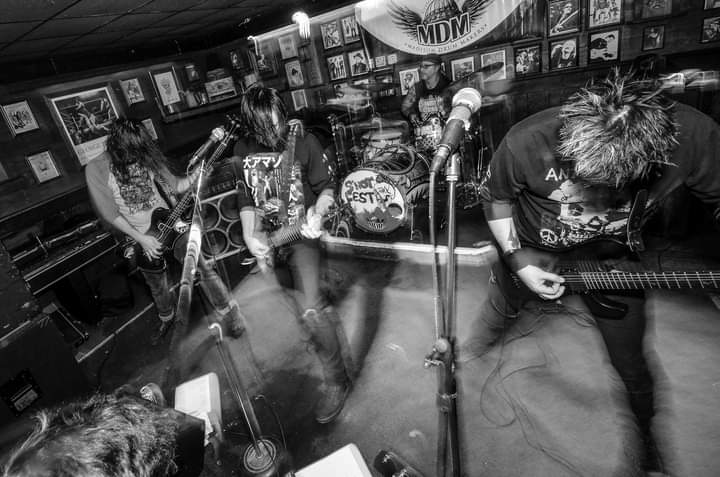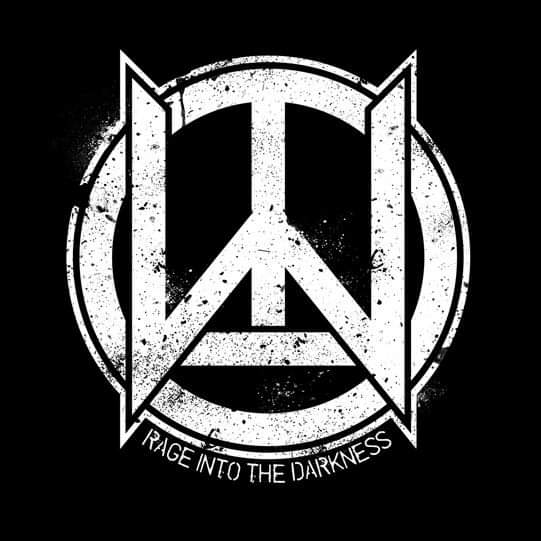This summer I wrote a long article about the Minneapolis hardcore punk scene that was published in the zero issue of Benzine, a punx fanzine created by some individuals from the Milan hardcore punk scene. The idea to write that article was born after the police murder of George Floyd and after the riots that crossed and burned the USA during the summer months. The publication of that article allowed me to get in touch with War//Plague, one of the most interesting crust punk bands in the Minneapolis scene and one of my favorites. I recently asked Leffer and Lutz a series of questions, covering a variety of topics ranging from revolts against racism and police violence, to the idea of punk music as a way of protest and political movement. Right now I can’t find the right words to explain you how happy and proud I am to have interviewed War//Plague, especially because we all share the idea that punk is and must still be a threat, so I’ll just leave you to their answers and wish you a good reading.
This summer, after Floyd’s brutal murder by police and in the wake of the raging riots, I wrote an article titled “Minneapolis Burns, Fragments of the Minneapolis Hardcore Scene,” starting first with the title of the Destroy EP “Burn this Racist System Down.”I wanted to ask, what can you tell us about the current hardcore punk scene in Minneapolis? What differences do you notice between today’s punk scene and that of the past in your city?
Leffer: Ever since George Floyds murder, life has been a bit unstable, yet the community is strong here in Minneapolis. Life has come to a stand still and a lot of people are in survival mode with the pandemic, etc. So punk life and energy has been redirected to the current state of affairs here. No gigs or gatherings but protests are constantly happening and that’s how many are coming together to give a sense of community and strength.
Lutz: The current state the punk scene here is a bit fragmented, but it’s still going strong. There just aren’t a lot of places to play and with the pandemic, no one is playing out. We’re all still on lock down for the most part, but hopeful things will turn around later this year. However, I think the punk scene is more charged than ever.
When was War//Plague born and where did your name come from?
Lutz: We started in the spring of 2008, still seems like yesterday. The name was kind of the amalgamation of ideas, surprisingly it’s probably a more relevant name now then it was back then!
Leffer: Like Lutz said, it was 2008, right after PROVOKED broke up. Lutz and I wanted to continue playing music so we started writing new material. Finding a name took quite a while as we wanted to really think on our approach and the basic musical theme of the band.
What is your position on the uprisings against police abuse and structural racism in U.S. society and culture that followed Floyd’s murder? How did the hardcore punk scene of your city live those days of revolt?
Lutz: The spring and summer of last year was very intense in the city. Constant protest, helicopters, military presence, etc. Not to mention all the white nationalists and knuckle draggers that came into the city to start more problems. The police in this area have been a menace for decades, many of them are extremely racist and violent. The day the precinct burnt down was very surreal… the turmoil in the air was thick. Police in riot gear on the roof, blockades, smoldering ashes and smoke from surrounding building, protests, people looting for diapers, food, etc.
The city spent millions to fortify downtown prior to the Killer Cop’s trial. After months of promising to dismantle the police and make changes, the city council invested millions to hire more police. People are pissed off and fed up. But one thing I can say, that the media doesn’t cover, is that summer really brought the community together. Not just the punk community, the southside community as a whole. The punk scene is and will always be allies. Systemic racism is real in this country and I believe this fight is far from over.
Leffer: The cops and police union here are incredibly corrupt. The history of racism within the police ranks has been running for far too long and the community has had enough. George Floyd changed the world and especially this area of Minneapolis as people are simply fed up with the constant fear. Floyds wasn’t the first murder to happen under a corrupt and racist system, but his unfortunate death has shed a large spotlight on what needs to change.
We are located quite close to where Floyd was murdered and have spent time at the intersection where he was killed as it is a memorial now. When you go to that spot, the feeling of sorrow and tragedy is overwhelming. However, it also gives a sense of urgency that something must be done and done now.
How is the current social and political situation in Minneapolis?
Leffer: The socio/politcal environment here is very strong and constantly moving. This community thrives on coming together and making sure voices are heard. Protests are frequent and well organized, which spreads far and wide with many people coming together as the urgency to be heard is felt by all.
The down side to it, is having provacateurs from the outside coming in to harm the cause or make things worse. We had random groups of white supremists and other trouble makers travel into town to start burning down parts of the city and trying to blame it on the peaceful protestors. Thankfully some of the media caught wind of this and some were caught, but the forces of evil are persistant with these types of people so the struggle continues.
Lutz: It is still very active. I expect momentum will pick up. Winter here is extremely cold and frigid. Though that has not stopped people from protesting. Not only are there protests against the racist system that has enabled these police to get away with murder, there are protests against the Line 3 pipeline going on. These oil lines break and poison the water. This also breaks treaty with the Anishinaabe peoples and will cause more climate change.
In a thought-provoking interview with DIY Conspiracy in 2019, you define punk as a Way of Protes and Political Movement. Would you care to elaborate on this approach of yours (which I totally agree with)?
Lutz: There are many different ways to protest. It can be throwing a brick through a window, but it can also be writing, music, art, etc. I think punk has always been a political platform for people that want to express themselves and go against the grain. Punk means questioning the norm, not conforming to the mainstream’s ideals and morals, etc. That in and of itself is a form of protest.
Leffer: Punk has been a political movement since its inception. It’s a form of protest and by raising your voice you want to be heard in a world that doesn’t listen. Punk is a also an educational tool. Personally, I learned more from a punk record at a young age than anything else. You learn about animal rights, free thought and working together for a better world.
What does it mean for you to play this kind of music and to be part of the punk scene?
Leffer: For me, it’s means everything. Punk and the punk community are in my blood and I wouldn’t be who I am today without it. I’ve met amazing people, played all over and travled the world all because of our passion for punk. It really is a driving force.
Lutz: Well, for me it’s a way to just let it all out. Scream and yell… get all that noise out of me. Use it as a way to put something out in the world that can inspire someone or change their point of view. Punk has been around for a long time now, some move on, sure, but that doesn’t mean give up the fight. You need to keep that rebellious spirit alive, keep dreaming and keep fighting. Otherwise, you’ve just given in to the system that oppresses so many.
Your last work “Into the Depths”, released a few years ago now, is a great work of riotous and angry crust punk. What can you tell us about that record? What themes did you try to address with that album?
Lutz: Thanks, glad you enjoy it! I guess the overarching theme of the record comes down to a few things like revolution, idealism, and internal conflicts. There’s a lot of songs that tackle the struggles with one’s self and the world’s problems constantly pushing its way into our everyday life. From war and capitalism to the mistreatment of others – treating people like they don’t matter or that they are just expendable machines. Basically, coming down to the fact that people can only take so much before everything boils over. The rich have had their time in the sun and really done nothing to contribute or help others, it’s time for everyone to get a piece of light. Yet you’ll regularly hear Conservatives and the rich talk about ‘trickledown economics’ and that the stock market shows a strong economy, blah, blah, blah… It’s all bullshit. Those are the fairy tales they tell people so they can keep making money while other starve.
Leffer: I feel that album is a reflection of our current world. We’ve written more intricate or mid-tempo songs in the past but this latest album was soley derived from the socio/political environment we’re in and it keeps getting uglier. So as long as it continues, we’ll continue the fight and to create rage and protest through our music.
Under what circumstances did the collaboration and split with Warwound come about?
Leffer: I was working closely with Ian Glasper (bass) of Warwound and through years of communication and friendship, it just sort of happened and both bands agreed on it.
Speaking for a moment of the purely musical side, which have been the bands that have influenced your sound since the beginning?
Leffer: We have diverse range of taste, but I could say a lot comes from a mix of UK crust/stench and old school Scandinavian hardcore punk. We do mix up some metal punk style riffs in our music but all in all we just write what feels good.
Lutz: So many, maybe too many to name. But I’ve been influenced by everything from Sepultura, Disfear to Killing Joke. Obviously growing up here, I was also influenced by bands like Misery and State of Fear. The Twin Cities scene over the years has had a big impact on me.
Minneapolis has a long and important history of protests and riots but also a very fertile hardcore punk scene. What do you think have been the most important bands that have kept this scene alive?
Lutz: Misery for sure, they carried that torch for decades. But I think a lot of great bands have come and gone, all of them contributed to the history of this punk community. I think we’re all antsy to get through this pandemic and hear what everyone has been up to.
Leffer: I agree with Lutz, MISERY definitely but there are so many. Minneapolis punk and those involved in the community around here usually are in it for life. It’s never usually been a trend or a fad but something more important in our lives. It also goes beyond the music, in regards to “bands”. There’s record stores, community action and venues to support others forms of politcal events, etc.
On Disastro Sonoro I have from the beginning shared Profane Existence’s famous motto “make punk a threat again”. Profane Existence is undoubtedly one of the most important historical realities of the Minneapolis hardcore punk scene, what is your relationship with this DIY project/collective/label?
Leffer: Most of the bands we’ve been involved with have been released off PE and have usually been a part of the PE collective through shows and other music related festivities.
Lutz: We’ve been involved in some form with PE for the last few decades. Provoked (our old band) put out some records on the label and the first War//Plague LP was on PE. At one point, the PE distro was in our living room at a punk house we all lived at, affectionately called the Shit Haus. We’re still friends with Dan, though he’s not really involved with PE these days, he still drives us on tour sometimes. Right before the pandemic hit, we played the PE anniversary show out in Pittsburgh at Skull Fest. Really fun time, saw a lot of old friends, met some new ones and Aus Rotten even played a few songs! It’s always cool to run into people you haven’t seen in over 20 years and they’re still involved and active in punk.
How are you experiencing the situation regarding the Covid 19 pandemic in the US? How has your life as a punk band changed at a time of such a severe health crisis?
Leffer: It’s been tough, but we’ve been able to keep somewhat sane through this process. We are constantly writing music, even if we’re not at band practice we write at home and even record guitar riffs on our computer and share them, so when we do meet up (once a week) we already have ideas of what’s next song wise. So the pandemic has actually been good for writing a lot of songs and finishing up our next LP.
The bad side of it, besides the vile and depraved system not taking care of it, is that venues and gigs are suffereing which a lot of artists rely on. It was a crushing blow for us when we had to cancel our tour with AXEGRINDER and to also play HAGL fest in Vancouver. We were really looking foward to touring again, but we’ll need postpone that until things are better. It’s always good to make sure people are safe during these times.
Lutz: Well… to put it bluntly, it sucks! But I know there are people struggling more, so you just have to roll with the punches and do your part to keep the disease at bay. There are a lot of conspiracy theorists in this country, not to mention the former orange-cheeto-wannabedictator, he really didn’t help the situation. For the most part, I think we are just trying to stay positive and active. I mean for the first like 6 months, we didn’t jam at all. We’re back to a regular schedule now, which has been great. We mask up and social distance. I think there is a sense of urgency in the new music we’ve been writing. We’re living through some historic times and I don’t think we’re out of the woods yet.
Future projects for War Plague? When will a new album be released?
Lutz: We’re working hard and have a ton of new material. So, I think a new album is definitely in the very near future.
Leffer: Yes, we’re working very hard to get this next album out. We were able to record a secret song for a future international compilation coming out later this year. Besides that, more touring and always more albums!
We have reached the end of the interview, so this space I leave completely to you, feel free to tell anecdotes or talk about anything you want! Thank you again for the time you spent answering my questions! Let’s continue to keep punk a way of protest and a movement of revolt!
Leffer: Yes, stay punk and stay active! Now is more important than ever to use what we have, and if that’s using your voice to scream, then so be it. Everything adds up and the more voices we have the louder we get. Thank you for the chance to have this interview and hope you and everyone else are staying safe in these uncertain times.
Lutz: Thank you for the interview, we really appreciate the support! I guess all I want to say is just keep up the good fight. Times are dark and they’ll probably get darker, but keep your head up, talk to your community, get involved, even if it’s just something small. Like I said, there are many different forms of protest, so do what you can. As much as it seems like the world in coming apart, remember there are tons of other people out there fighting hard to make a change. Depression during Covid is another pandemic I’m sure many are dealing with. Don’t bottle it up. Reach out and talk to people. There are a lot of assholes in the world, but there’s only one you and there’s a community out there willing to help. Cheers!

